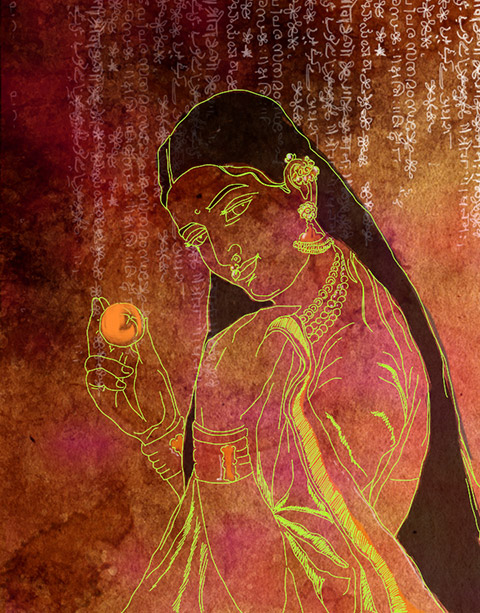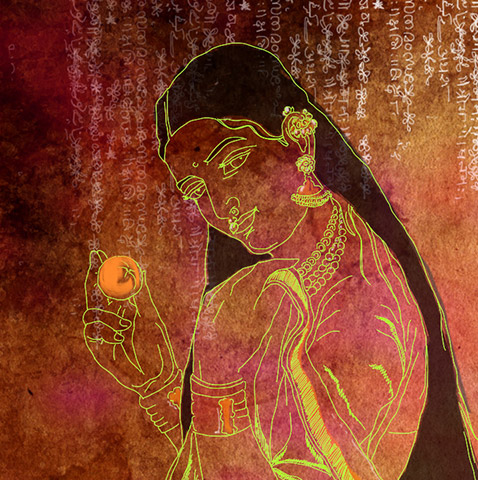Four men were sentenced to death on September 13 and millions of Indians felt vindicated. Those responsible for a crime described as ‘rarest of the rare’ met with justice. We can all feel a little less guilty and go back to our lives.
It’s easy to fashion an angel in the form of ‘Delhi’s daughter’, mourn her martyrdom, fight for her honour, and thump fists cathartically when her purity and goodness trumps the bad guys’. However, it’s not as easy to see her as just an ordinary woman—not as someone’s daughter, sister, or mother, but as someone with ordinary hopes and dreams that were cruelly crushed not just by six drunk miscreants, but by an entire society that refused to accept her as an equal and free member. Rarest of the rare though the gruesome details of the incident may have been, she was not alone in carrying this cross. Her death will not save us from our sins.

Ravi Retold. Artwork by Nirupa Rao.
I recently had a conversation with my friend, artist Raghava K. K., about India being the land of the impossible narrative. Every modern nation subsists on a story of why it came together, whether that be the American dream, Superman, and hamburgers, or cheese, wine, and the French Revolution. The people of India, however, were happy living out a thousand different narratives before we were compelled to create one that would unite us against an invading force. We talked about how these countless beautiful narratives have slowly been overshadowed by those who understand how powerful a story can be, and have claimed the right to tell the story of India—its past, its present, and if they have their way, its future.
Many years ago, Lev Nikolayevich Tolstoy told a story about a woman named Anna Karenina, a 19th century Russian aristocrat who became the tragic victim of a hypocritical, patriarchal society that conquered her spirit. I’m ashamed to admit that I don’t read as much as I used to—I’ve been dragging Anna around with me for over six months because, you know, Buzzfeed. It’s much easier to mindlessly scroll down a list of ways your early 20s were different from your late 20s than to invest time in investigating the lives and ideas of those who came before us. I’m glad I did though, because as I was reading, it suddenly struck me that these women—Anna, Elizabeth Bennet, Lady Chatterley, Tess of the d’Urbervilles—were all the same as me and so many other Indian women today: women yearning for a life prescribed by their own instincts rather than by the people around them.
I suppose I knew this already, but the recent outbreak of bizarre statements in the public domain, ranging from allegations of suffering from chronic male-attraction disease and Lakshman Rekhas being crossed to having legitimate reasons for burning one’s daughter alive, quickly dragged everything into focus. We are being told a story; one that elevates downright misogyny to the revered status of Indian Culture.
In no way are any of the atrocities Indian women are subjected to explained or justified by said Indian Culture. They are instead manifestations of a cultural backwardness that every society has grappled or is grappling with on their evolutionary journey. For centuries, women have played second fiddle to men all over the world, until organic, dare I say, feminist movements sprung up to strive for equality. Arranged marriages, patriarchal inheritance laws, sexual repression, religious hegemony, Puritan attire, societies that take it upon themselves to define your life for you and throw you to the dogs if you dare to dream—to claim these ideas as particularly Indian is, at worst, a deliberate deception, and at best, a lazy cop-out. Western societies have been through them all and gotten, to various degrees, to the other side. Even Sweden, where I currently live, with its paternal leave, pay differentials between the sexes being among the lowest in the world, and nuanced laws regarding sexual violence, once lived through every backward idea on that list.
When an article written by an American woman about her horrific experiences with sexual harassment in India started floating around the Internet a month ago, it shocked me that certain educated, young, Indian women’s reactions were to belittle her claims with the dubious argument that this kind of thing “happens everywhere in the world”. The article, in parts, could be construed as exaggerated, but I really couldn’t discount its plausibility either because every Indian woman, whether she admits it or not, has faced sexual harassment, or worse, in some form or the other—be it unspeakable physical violation of her private body or the psychological unpeeling of her clothes in the middle of a busy street by eyes gleaming with pent-up desire.
One woman alleged that she’d faced similar experiences in Paris as well. Certainly, the so-called first world still has some way to go, which is something that most people who live in it admit freely. No one can deny that displays of cultural backwardness occur, often at alarming rates, in modern, progressive societies. But women in these societies can wear, work, go out with, live with, and marry what, where, and who they choose to, as well as legitimately expect the police to do something if their rights are violated. This isn’t the case for the majority of women in India. Sure, some of us are lucky to have been afforded these opportunities by the liberated men and women in our lives; others have fought hard for and won these precious freedoms. But in this case, we’re the ones who have fallen through the cracks.
To these responders, I concede that in this country of countless narratives, it is possible you have felt as empowered as any Western woman could ever feel. I don’t mean to deny or dismiss your experiences. What I would like to know is why you chose to tell this particular story? The telling of a story is—consciously or subconsciously—always a political act. It can reinforce or break ideas, change entrenched perspectives, give hope, encourage delusions, delineate the course of history, or smash it to pieces with a single stroke. It has that much power. So why, as Indian women of privilege, did you choose to defend the image of Incredible India over acknowledging the plight of millions of women who don’t have a voice? What was your point?
Another argument raised by these counter-articles and their Facebook propagators was about the ‘danger of generalising a culture’. With that, I couldn’t agree more. When a politician informs a nation of different backgrounds, upbringings, and ideas what Indian Culture is, that’s a dangerous generalisation; as is when this upstanding guardian of the law stakes a claim on its definition. “We have a different culture,” he declares, “if you see someone, if you feel respect about her, she is respectable. If she would be respectable this would never happen to her. You cannot say that only the rapists are responsible. She’s also responsible equally…”
No, don’t be shocked or distance yourself from this deluded man. Someone in your family or on your street likely thinks the same, even if he or she knows better than to say it on camera. The worst part is, we are fooling ourselves if we believe this subjugation of a group within families and communities ever had anything to do with virtue or chivalry. I believe this story of a holier-than-thou Indian Culture has been deliberately planted and nurtured—what better way is there for a ruling class to maintain the status quo than by convincing a powerless proletariat that it does have power after all? So don’t sit on your high horse and tell me this ‘culture’, crafted from the weakest pieces of pre-colonial behaviour and crystallised in Victorian morality, is my culture. I’m not buying it.
The word culture comes from the Latin cultura animi, which means cultivation of the soul. It implies an ongoing process of evolution. I don’t accept that it refers to an immutable order of society where women’s roles alternate between goddesses and whores, and men get to decide when this fall from grace is warranted.
It’s election season again, and as usual we’re all divided on which among our choices is the so-called better evil. As usual, this determination is based on economics and what we’ve come to think of as development. That’s fine, the economy is important, but I long for the day when we decide it’s as important for true social reform to enter the discourse and promise-lists of our politicians. Somehow, I believe that a country’s development hinges more on the liberation and empowerment of half its members than on the presence of a Starbucks on every corner.









It’s going to take a very long time for our countrymen (and women) to accept the reality that rampant crimes against women are an indication of our deep set complexes, and has nothing to do with Indian culture. Even the judgment in the Delhi rape case had to rely heavily on the evidence of extreme brutality to declare it “rarest of rare” and thereby warranting the death penalty. What does it mean? Rape sans extreme brutality is less of a crime? No sir, that’s not the answer. If the judgment was meant to act as a deterrent it should have simply read – if you rape, you die! period.
“I believe that a country’s development hinges more on the liberation and empowerment of half its members than on the presence of a Starbucks on every corner” loved it.